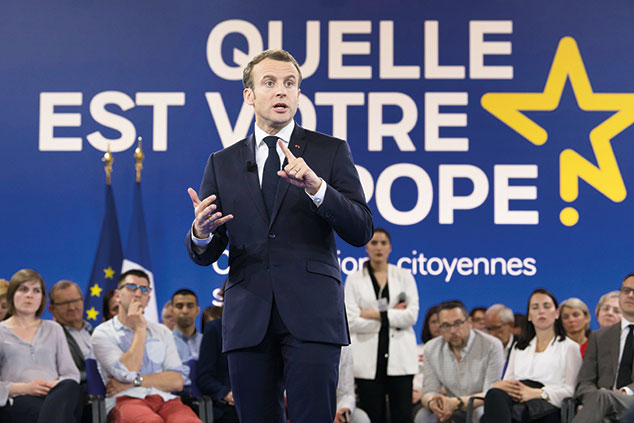
Germany may frustrate the French leader’s ambitions. Matthew Partridge reports.
On Tuesday, Emmanuel Macron “delivered the sort of speech he should have been shouting from the rooftops of the Élysée from the moment he was elected president nearly a year ago”, says Jane Merrick in The Independent. He warned of “a ‘civil war’ between liberal democracy and the authoritarian right” and a growing “fascination with the illiberal”. The response should “not be authoritarian democracy but the authority of democracy”, he argued. Reform is therefore needed, “not to extinguish” the EU’s core purpose, but “to modernise it so fewer countries seek to follow Britain out of the door”.
Macron may be able to “hold a phrase” and “turn a stage”, says Peter Foster in The Daily Telegraph, but it will take more than “warm words” for the rest of the bloc to accept his “reforming zeal”. Despite his “clear swipe” at the “illiberal democracies” of Poland and Hungary, both countries will stick to their “refusal to buckle under the writ of the European Commission”. At the same time, “German taxpayers are no more willing to underwrite their poorer eurozone cousins… than Hungarian and Polish citizens are to accept migrant quotas”.
Beat a tactical retreat
Despite being a “long-standing advocate of eurozone reform”, I favour a “tactical retreat”, says Wolfgang Münchau in the Financial Times. The pro-European parties in Germany are on the back foot, and two key issues – “the creation of a single safe asset, or a eurozone bond; and the legal and political separation of national governments and their banks” – are not even on the agenda. So why waste “scarce political capital on weak reforms”, which may well come with tough conditions that could contribute to financial instability?
Macron should concentrate his efforts on his “more prosaic” agenda: “the reform of the eurozone’s financial infrastructure”, adds an FT editorial. This is of “potentially existential importance to the EU”. There should be “room for common ground” on the “most crucial feature of banking reform, a common deposit-insurance scheme funded by all European banks” as well as the “conversion of the European Stability Mechanism to a European monetary fund with a broad mandate to manage sovereign bailout programmes”. Macron can afford to be flexible about the structure if it paves the way for “more centralised financial capacity in the euro area”.
Aim for a two-tier Europe
More generally, “the lesson of the Hungarian election is that too much of Europe only empowers the hard right against it”, says The Times, while one lesson of the German elections is that Europe’s “strongest economy will no longer accept responsibility for the debts and profligacy of its weakest”. Macron and his ilk must “respect the democratic process even where they do not like its outcome”. Macron’s challenge is to “make Europe more streamlined, accountable and popular, not more overbearing”, possibly by creating a two-tier Europe with greater and lesser degrees of integration. “If he can rein in his inner Napoleon, Germany’s new coalition might just play along.”
Airstrikes won’t change the Syrian war
Theresa May’s use of royal prerogative to authorise the UK’s involvement in US-led air-strikes on Syria “was the wrong thing to do”, says The Guardian. “Parliament is the best place to assess whether the use of military force serves the overall interests of a nation.” This is especially true of a government without a majority.
Give May a break, says The Daily Telegraph. She “convincingly” spelled out her reasons in the House of Commons “both for taking action and not consulting parliament in advance”. “The limited action taken to uphold international protocols prohibiting the use of chemical weapons” seems to have been “an unqualified success”. And despite the fears of critics, it “has not drawn [the US, the UK and France] into a wider conflict with Russia”.
Unfortunately, the strikes will “have done little to change the trajectory of the Syrian war”, says Gideon Rachman in the Financial Times. It will simply confirm that “America’s power in the Middle East is on the wane”. The many conflicting regional interests in Syria mean that peace is likely to “remain elusive”. Israel and Saudi Arabia in particular are concerned by Iran’s increased influence in the country.
The potential for a direct clash between Saudi Arabia and Iran is a reminder of the wider risks that this conflict poses, adds Andy Critchlow in The Daily Telegraph. So far, their “squabble” has been limited to a proxy war in Yemen, but a “clash between the two heavyweights” could jeopardise the security of Strait of Hormuz – through which about a fifth of the world’s crude is shipped every day.